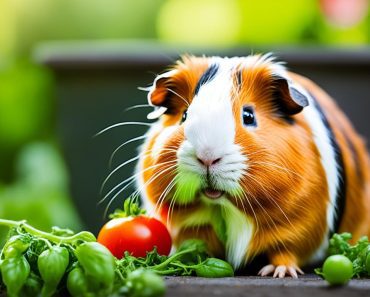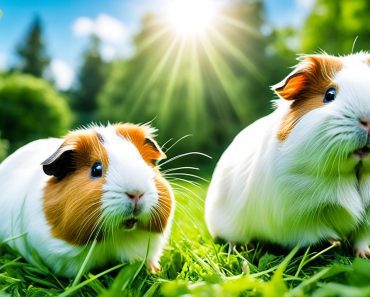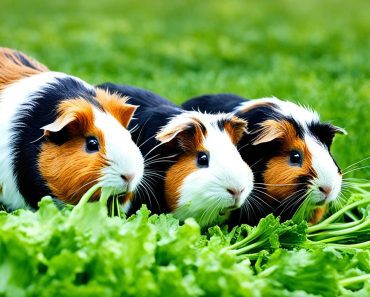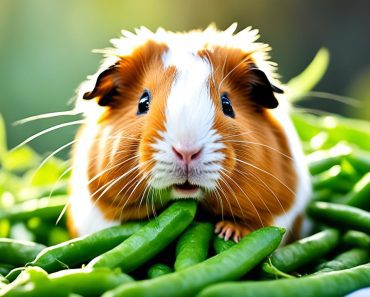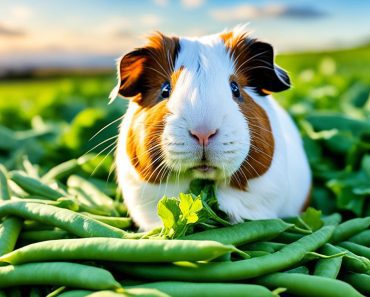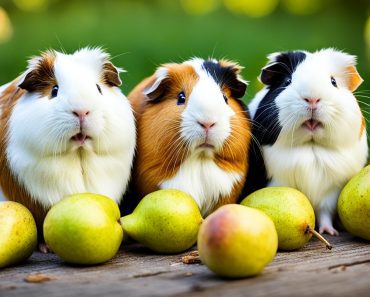Hello, fellow guinea pig lovers! Today, I want to talk about a popular question that often comes up in our little furry friends’ nutrition: Can guinea pigs eat cucumbers? As a guinea pig owner myself, I understand the importance of providing a balanced and nutritious diet for our adorable companions. So, let’s dive into the world of guinea pig nutrition and learn all about feeding cucumbers to our little buddies!
Cucumbers are a refreshing and hydrating vegetable that many of us enjoy during the hot summer months. But are they suitable for our guinea pigs? The answer is yes! Guinea pigs can indeed eat cucumbers, and they can enjoy the skin, seeds, and flesh of this versatile veggie.
Now, let’s talk about the nutrition aspect. Cucumbers are low in sugar and high in water content, which can help keep guinea pigs hydrated, especially during warm weather. However, they are relatively low in fiber and vitamin C. Therefore, while it’s safe to feed cucumbers to our furry friends a few times a week, it’s crucial to offer them in moderation and alongside other less watery vegetables.
Can Guinea Pigs Eat Cucumbers? Yes, they can eat it sparingly.
- Cucumbers can be included in a guinea pig’s diet and are safe for them to consume.
- Guinea pigs can eat the skin, seeds, and flesh of cucumbers, but it’s important to feed them in moderation.
- Cucumbers are high in water and low in fiber and vitamin C, so they should be given alongside other vegetables to ensure a balanced diet.
- Feeding cucumbers can help keep guinea pigs hydrated, especially during hot weather.
- Monitor the guinea pig’s response to cucumbers and adjust the quantity if necessary to avoid stomach upset.
Nutrition in Cucumbers for Guinea Pigs
When it comes to the nutrition of cucumbers for guinea pigs, it’s important to understand their composition and dietary impact. Cucumbers are low in sugar and calories, making them a healthy addition to a guinea pig’s diet. However, they are also high in water content, which can affect their suitability as a primary source of nutrition.
Cucumbers contain low levels of fiber and vitamin C, which are important components of a guinea pig’s diet. While it is safe to feed cucumbers to guinea pigs a few times a week, it is crucial not to offer them large quantities. A half-inch chunk of cucumber is sufficient as part of their daily vegetable portion.
To ensure a well-balanced diet for guinea pigs, it is recommended to mix cucumbers with other vegetables that are less watery but rich in essential nutrients. Some excellent options include pumpkin, mint, parsnip, dandelions, parsley, basil, kale, fennel, and sweet bell peppers. Combining cucumbers with these veggies will provide a more diverse and nutritious diet for your guinea pig.
In addition to their nutritional value, cucumbers can be particularly beneficial during hot weather. Their high water content helps keep guinea pigs hydrated and reduces the risk of dehydration. So, offering cucumber slices alongside other vegetables can be a great way to promote the overall health and well-being of your furry friend.
Cucumber Nutrition Profile for Guinea Pigs
Let’s take a closer look at the nutritional content of cucumbers per 100g:
| Nutrient | Amount |
|---|---|
| Vitamin C | 2.8mg |
| Calcium | 16mg |
| Phosphorus | 24mg |
| Fiber | 0.5g |
| Sugar | 1.7g |
While the vitamin C content is relatively low, cucumbers still contribute to the overall nutritional needs of guinea pigs, especially in terms of hydration. It’s essential to consider the calcium and phosphorus content and balance them with other vegetables to prevent imbalances or potential health issues in guinea pigs.
Nutritional Value of Cucumbers for Guinea Pigs
When it comes to guinea pig nutrition, it is essential to understand the nutritional value of the foods we feed them. Cucumbers, a popular vegetable, offer various nutrients that contribute to the overall health of guinea pigs.
Per 100g, cucumbers provide approximately:
- 2.8mg of vitamin C
- 16mg of calcium
- 24mg of phosphorus
- 0.5g of fiber
- 1.7g of sugar
While the vitamin C content in cucumbers is relatively low compared to other fruits and vegetables, it still contributes to guinea pigs’ overall nutritional needs. Vitamin C is crucial for their health as it helps support their immune system and plays a vital role in preventing scurvy.
Cucumbers are also high in water content, making them an excellent hydrating option for guinea pigs, particularly during hot weather. Hydration is essential for maintaining optimal guinea pig health and ensuring their bodily functions are well-regulated.
However, it’s essential to note that cucumbers are relatively low in fiber. Fiber promotes healthy digestion and helps prevent gastrointestinal issues in guinea pigs. It’s important to balance cucumber consumption with other fiber-rich vegetables to ensure their digestive system remains healthy and functioning properly.
In terms of calcium and phosphorus content, cucumbers provide moderate amounts. While an adequate intake of calcium and phosphorus is necessary for guinea pigs, an imbalance in these minerals can lead to health issues, such as urinary tract problems. It’s crucial to consider the calcium-to-phosphorus ratio in their overall diet and ensure a proper balance is maintained.
Overall, while cucumbers may not be a primary source of essential nutrients for guinea pigs, they still offer hydration, vitamin C, and moderate amounts of calcium and phosphorus. Including cucumbers in their diet, along with a variety of other vegetables, can contribute to their overall health and well-being.
Are Cucumbers Safe for Guinea Pigs?
Yes, cucumbers are safe for guinea pigs to eat. They can consume the skin, seeds, and flesh of cucumbers without any harm. However, it is important to feed cucumbers in moderation and alongside a variety of other vegetables to ensure a balanced diet for guinea pigs.
Cucumbers are a refreshing and hydrating addition to a guinea pig’s diet. Their high water content can help keep your furry friend hydrated, especially during hot weather. However, cucumbers should not make up the majority of their diet as they are low in fiber and vitamin C.
When offering cucumbers to your guinea pig, make sure to wash the skin thoroughly to remove any potential pesticides or contaminants. Organic cucumbers are preferred, but if unavailable, a good wash with water should suffice.
Feeding cucumbers to guinea pigs should be part of a diverse and balanced diet. Here is a table summarizing the nutritional value of cucumbers for guinea pigs:
| Nutrient | Amount per 100g |
|---|---|
| Vitamin C | 2.8mg |
| Calcium | 16mg |
| Phosphorus | 24mg |
| Fiber | 0.5g |
| Sugar | 1.7g |
While cucumbers may not be high in certain nutrients, they still provide some nutritional value to guinea pigs. It is important to consider the overall balance of their diet and provide a variety of vegetables to meet their nutritional needs.
The Benefits and Downsides of Feeding Cucumbers to Guinea Pigs
When it comes to the guinea pig diet, cucumbers offer both benefits and potential downsides. Let’s explore the advantages and disadvantages of feeding cucumbers to these adorable little pets.
The Benefits of Feeding Cucumbers to Guinea Pigs
Cucumbers can provide several health benefits to guinea pigs:
- Hydration: Cucumbers have a high water content, making them an excellent source of hydration for guinea pigs, particularly during hot weather.
- Vitamin C: While cucumbers contain lower levels of vitamin C compared to other vegetables, they still contribute to the guinea pig’s overall nutritional needs.
Feeding cucumbers in moderation alongside a well-balanced guinea pig diet can help enhance their health and well-being.
The Downsides of Feeding Cucumbers to Guinea Pigs
However, there are a few downsides to consider when feeding cucumbers to guinea pigs:
- Stomach Upset: Feeding cucumbers in excess can lead to stomach upset and diarrhea in guinea pigs. This can potentially result in dehydration, which is harmful to their health.
It is crucial to closely monitor the amount of cucumber given and pay attention to how the guinea pig responds. If any negative effects occur, it’s best to reduce the quantity or consult a veterinarian.
Tip: Cucumbers should not be the sole vegetable in the guinea pig’s diet. It’s important to provide a varied selection of vegetables to ensure a balanced nutrition.
Cucumbers can offer hydration and some essential nutrients to guinea pigs. However, it’s vital to feed them in moderation, observe their response, and include other vegetables in their diet to maintain a balanced nutritional intake.
| Benefits | Downsides |
|---|---|
| Hydration | Stomach upset if consumed excessively |
| Vitamin C contribution |
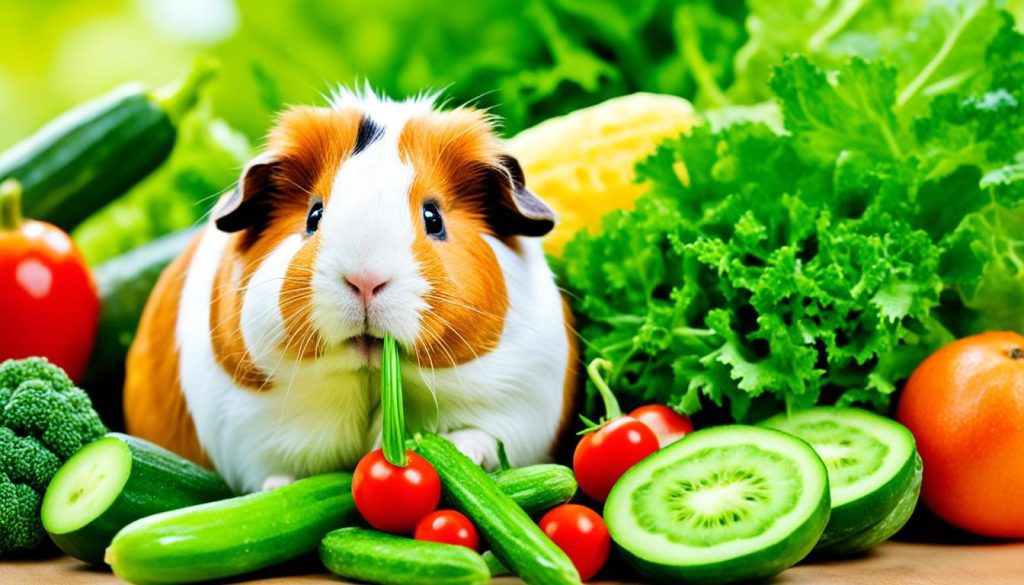
Recommended Amount of Cucumbers for Guinea Pigs
As part of a guinea pig’s daily diet, it is important to provide them with around one cup (250g) of fresh fruits and vegetables, alongside hay and pellets. When it comes to feeding cucumbers, the recommended starting amount is approximately 40g per day, depending on the calcium-to-phosphorus ratio of other foods in their diet.
This can be roughly equivalent to one to two slices of a regular cucumber, measuring one to two inches in thickness. It’s crucial to consider the balance of nutrients in the guinea pig’s overall diet to ensure they receive the necessary vitamins and minerals.
Monitoring the guinea pig’s urine output is also essential as it can indicate any potential imbalances or issues with their diet. By maintaining a healthy amount of cucumbers in their daily intake, you can contribute to their overall well-being.
The Proper Balance of Nutrients
It is important to note that cucumbers are not a primary source of nutrition for guinea pigs. While they can provide hydration and some essential nutrients, they should be part of a diverse and balanced selection of vegetables in a guinea pig’s diet.
By incorporating other nutritious vegetables into their diet alongside cucumbers, such as bell peppers, parsley, kale, and spinach, you can provide the necessary vitamins and minerals that guinea pigs need to thrive.
| Nutrient | Amount per 100g |
|---|---|
| Vitamin C | 2.8mg |
| Calcium | 16mg |
| Phosphorus | 24mg |
| Fiber | 0.5g |
| Sugar | 1.7g |
Although cucumbers might not have high levels of vitamin C, they still contribute to the overall nutritional needs of guinea pigs, especially in terms of hydration. It’s essential to provide a well-rounded guinea pig diet that includes a variety of vegetables to ensure their optimal health and well-being.
Other Vegetables Suitable for Guinea Pigs
In addition to cucumbers, there are a variety of other vegetables that are suitable for guinea pigs. These vegetables provide essential nutrients and contribute to a well-rounded diet for our furry friends. Here are some of the best vegetables for guinea pigs:
- Asparagus
- Broccoli
- Cabbage
- Carrots
- Cauliflower
- Corn on the cob
- Green beans
- Peas
- Parsley
- Parsnip
- Beetroot
- Sprouts
- Spinach
- Squash
- Tomatoes
- Turnip greens
- Watercress
- Red cabbage
- Red peppers
These vegetables provide a range of flavors and textures, ensuring that your guinea pig enjoys a diverse and enticing diet. It is important to offer a variety of vegetables to promote good health and nutrition for your furry companion.
Creating a Balanced Guinea Pig Diet
A balanced guinea pig diet consists of a combination of hay, pellets, and a variety of fresh vegetables. The vegetables should make up a significant portion of their diet, along with unlimited access to hay. Pellets should be given in moderation to avoid an imbalance in nutrition.
Remember, guinea pigs have specific dietary needs, and it’s important to consult with a veterinarian or an animal nutritionist to ensure your pet is receiving the proper nutrition.
By offering a mixture of different vegetables, you can provide your guinea pig with the necessary vitamins, minerals, and fiber for optimal health. Remember to introduce new vegetables gradually to prevent digestive issues, and always observe your guinea pig’s response to new foods.
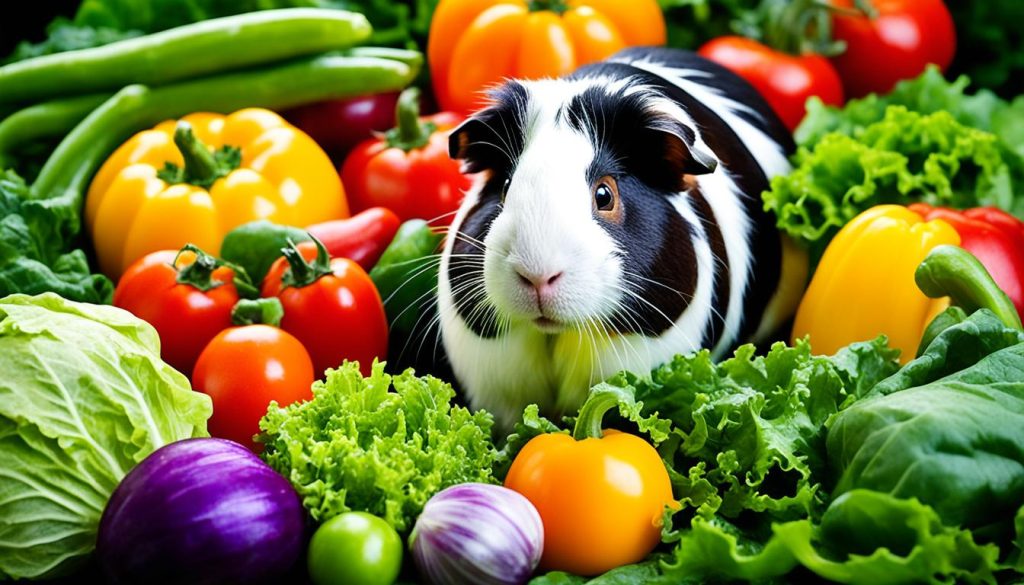
Feeding a variety of vegetables not only ensures nutritional balance but also adds enrichment to your guinea pig’s diet. Observing their preferences and monitoring their overall well-being will help you fine-tune their vegetable selections for maximum enjoyment and health benefits.
| Vegetable | Nutrition |
|---|---|
| Asparagus | Rich in vitamin K, vitamin C, and fiber. |
| Broccoli | High in vitamin C, vitamin K, and fiber. |
| Cabbage | Provides vitamin C, vitamin K, and fiber. |
| Carrots | Rich in vitamin A, vitamin K, and fiber. |
| Cauliflower | High in vitamin C, vitamin K, and fiber. |
| Corn on the cob | Provides vitamin C, vitamin B6, and fiber. |
Conclusion
Guinea pigs can safely enjoy cucumbers as part of their diet. Both the skin and seeds of cucumbers are suitable for guinea pigs to eat. Cucumbers provide hydration and offer some essential nutrients for guinea pigs. However, it is crucial to feed cucumbers in moderation and as part of a balanced diet that includes a variety of other vegetables.
While cucumbers are a refreshing treat, they should not be the sole focus of a guinea pig’s diet. Hay and pellets should always be the main components, as they provide the necessary fiber and nutrients. It is important to monitor your guinea pig’s response to cucumber and make adjustments as needed.
To ensure optimal care for your guinea pig, prioritize a diverse selection of vegetables alongside cucumbers. Include options such as asparagus, broccoli, carrots, spinach, and more. This variety will help provide a well-rounded diet and meet your guinea pig’s nutritional needs.
By offering cucumbers in moderation, alongside a diverse range of vegetables, you can ensure your guinea pig’s well-being and provide a balanced diet for their overall health.

